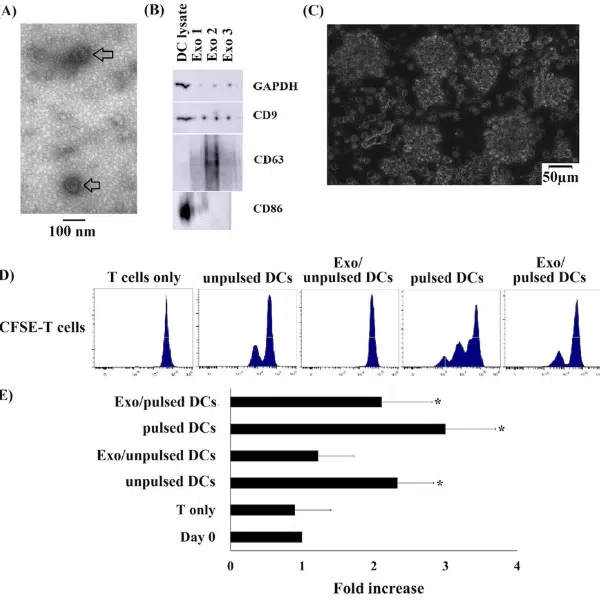This study focused on investigating the use of exosomes derived from dendritic cells (DCs) as a vaccine to activate the immune system against lung cancer. The researchers used cryopreserved umbilical cord blood cells to create the DCs and their exosomes. These exosomes showed promising results in stimulating the proliferation of immune cells and enhancing their ability to target lung cancer cells.
The findings indicate that cryopreserved cord blood can be a viable source for generating DCs, offering potential for future immunotherapies against cancer. Additionally, tumor cell lysate-pulsed DCs and their exosomes could be considered as a novel immunotherapeutic strategy for lung cancer patients, potentially leading to the development of effective cancer vaccines.

Presented are clinical studies of pancreas cancer (PCA), an aggressive and common tumour. The studies took place in two centers and both made the treatments by oncothermia combined with the conventional therapies. The final results show an exceptional survival benefit for the patients in comparison to historical data and the feasibility of the oncothermia treatment of PCA.
This study was conducted to investigate the potential of using exosomes (small vesicles that are released by cells) derived from dendritic cells (DCs) as a vaccine to stimulate the immune system to recognize and attack cancer cells. The researchers used cryopreserved umbilical cord blood mononuclear cells to create the DCs and tested their ability to prime the proliferation of T cells (a type of immune cell) and to increase the cytotoxicity (ability to kill) of allogeneic peripheral blood mononuclear cells (alloPBMCs) against lung cancer cells. They found that both the DCs and their exosomes were able to stimulate the proliferation of allogeneic T cells and enhance the cytotoxicity of alloPBMCs against the lung cancer cells.
From July to December 2018, this study was done with four umbilical cord blood (CB) units that satisfied the cryopreservation standards at the private cord blood bank at Vinmec International Hospital in Vietnam. Before blood was taken, it was screened for transmissible illnesses. The blood required to be free of the human immunodeficiency virus, hepatitis B, hepatitis C, cytomegalovirus, and syphilis to be considered.
Experiments were conducted to see if cryopreserved umbilical cord blood mononuclear cell-derived DCs (cryo CBMDCs) and their exosomes might trigger allogeneic T cell proliferation and cytotoxicity against A549 lung cancer cells. Four umbilical cord blood (CB) units from four different donors were removed from storage in liquid nitrogen and immersed into 37 °C water (usually less than 2 min). The CB units were partially thawed until they had a slushy consistency and then diluted with an equal volume of RPMI 1640 supplemented with 20% (v/v) fetal bovine serum (FBS). Each suspension was then mixed and centrifuged for 10 min at 4 °C. The supernatants were discarded and the sedimented cells were re-suspended in 20% (v/v) FBS in phosphate-buffered saline (PBS) with a pH of 7.4 for umbilical cord blood mononuclear cells (CBMCs). Following, these practices were completed in order to achieve the results: Generation of DCs, A549 Lung Carcinoma Cell Culture and Preparation of Tumor Cell Lysates, Exosome Isolation, Analysis of Exosome Morphology via Transmission Electron Microscopy and Western Blot Analysis, Allogeneic T Cell Purification and Proliferation Assay, Allogeneic T Cell Subset Proliferation Assay, and a Cytotoxicity Assay.
Results of this experiment demonstrate a Successful Generation of Cryopreserved Umbilical Cord Blood Mononuclear Cell-Derived DCs (Cryo CBMDCs). DCs were successfully generated from cryo CB in culture medium containing GM-CFS, IL-4, and TNF-α, which consistently showed a DC marker expression profile, such as CD80high, CD86high, CD40high, HLA-DRhigh, CD123low CD56low, and CD14low. Cryo CBMDCs expressed a typical DC morphology with thin and long dendrites, which have been described in previous reports. Thus, our results indicate that cryo CB can be a potential source for DC generation, which then may be developed into immunotherapies.
The development of tumor cell lysate-pulsed DCs and their exosomes should be considered into a novel immunotherapeutic strategy—e.g., vaccines—for patients with lung cancer. The findings also suggested that a conveniently available source of frozen umbilical cord blood mononuclear cells is effective for the creation of allogeneic DCs, and their exosomes will be useful for cancer vaccination.
© 2024 Immucura. All Rights Reserved
Loading form… Please wait…
Loading: Please wait…
Loading form: Please wait…
Loading: Please wait…
Loading form: please wait…